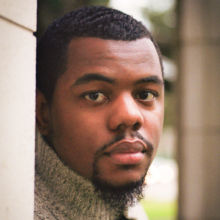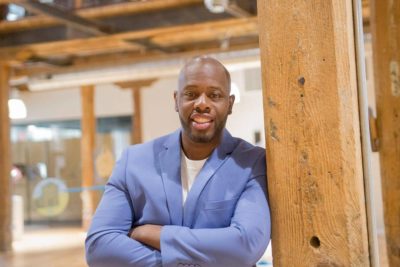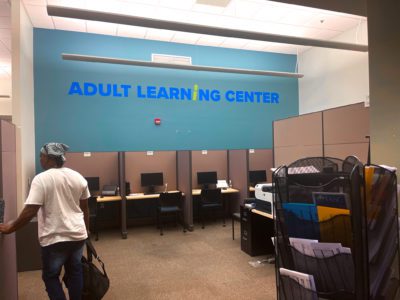
|
|
For these three Black women doctors, faith believers, and sisters, Pitt County is where the journey took root. Throughout years they have sustained a nurturing sisterhood, supporting each other in their pursuits of a doctorate degree and the goal of being an inspiration to others who come behind them.
North of the River
Located north of the Tar River, just a few miles apart, are the neighboring towns of Bethel and Belvoir. These are the places where Dr. Monisha Atkinson and Dr. Nicole Moore were born and raised, respectively.

This proximity would ignite a relationship that has spanned across decades. So much so that, well before the degrees, Dr. Atkinson nostalgically recalled her younger days when Dr. Moore was her babysitter.
“She was family,” Dr. Moore said.
Years later, fate would see to it that their educational journeys not only intersected, but aligned.
For Dr. Moore specifically, entering into the teaching profession was less of a personal desire, rather obedience to a calling. During her time as an undergraduate student at East Carolina University (ECU) is where she recounts the experience: “I heard the Spirit say ‘teach.’”
Dr. Moore admits she was initially defiant to the Spirit’s instructions for her to change majors. Yet, when the car she borrowed from her aunt refused to crank, she took it as a sign to stop and listen.
It was only when the forms to enter the College of Education were submitted that she remembers the car starting on the first try.
Full circle

Dr. Moore’s road to being an educator wasn’t without stumbling blocks. Ultimately, she graduated undergrad with a degree in English.
Immediately after, she entered the world of finance, beginning in the mortgage department of a bank, eventually transitioning to being the assistant to the vice president.
Yet, as she reflected, “God still would not let me go.”
Dr. Moore entered the classroom via an alternative pathway, becoming a middle school English language arts (ELA) teacher in Wilson County.
In the years since, Dr. Moore has worn several hats in K-12 education, including being an English teacher, reading coach, assistant principal, and principal.
Now, she works at ECU’s College of Education Office of Clinical Experiences.
“It’s kind of come full circle,” she said, “because it brings me right back to the place that I got started in education.”
The power of representation
Dr. Atkinson recollects her own childhood experiences as being riddled with moments of questioning as a result of being with one of few Black little girls in spaces of primarily white students and educators. More specifically, when aspects of her culture, such as language, were constantly criticized and labeled improper, her sense of identity, culture, and heritage was challenged.
For that reason, she showed deep reverence for Ms. Betty Moore, Ms. Mary Koonce, and Mr. Walter Blount, stating that having Black teachers like them was transformational in her education journey.
“It let me know that I do matter,” she said.

Years later, Atkinson found her way back to the classroom, embracing the opportunity to be that representation and connection for her own students. This would also be the role that reinforced the connection with her sister, Dr. Moore.
Though a principal in a different county, Dr. Moore, described as the person who “came to my rescue,” reached out during Dr. Atkinson’s first year as a teacher, helping to make sure she felt seen and supported with lesson planning, setting up her classroom, and other resources.
In a ripple effect, Dr. Atkinson worked to exemplify the same intentionality, recalling moments with a late colleague who, at the time, was a teacher’s assistant. Atkinson encouraged her to continue her education.
The joy of knowing that she could help plant the seed to inspire someone else to follow in the footsteps of education is embodied with the phrase, “I did that!”
However, for Dr. Atkinson, it’s not about boasting, but rather about “nurturing those relationships with fellow Black women in education.”
That nurturing continued as Dr. Atkinson transitioned to working alongside Dr. Moore and Dr. Julia “J” Lynch in clinical experience at ECU’s College of Education.
A sisterhood ordained
Not far from her sisters north of the river, Dr. J was raised in Greenville. Before working with them in higher education, she spent nearly 10 years in public schools, where she first crossed paths with both Dr. Moore and Dr. Atkinson.
In years prior, Dr. J and Dr. Atkinson would become acquainted via a separate connection amongst two of their relatives. Earlier in life, Dr. J was a cheerleader, and Dr. Moore assisted the coach of the squad. She would eventually teach at the same school that Dr. Moore not only taught at, but also attended as a child.
“[…] Because I am a faith believer, I know that this whole process, this whole relationship between doctors Atkinson and Lynch was just ordained.”
Dr. Moore
For Dr. J, being in the classroom was significant, especially in contrast to her experience as a student, where she didn’t have a Black woman as a teacher until receiving a mentor in her doctoral program.
Described as fierce and not willing to back down, even in white spaces, Dr. J shared that her mentor taught her “how to take criticism from another Black woman, and not feel as though it was in judgment, but it was out of love.”
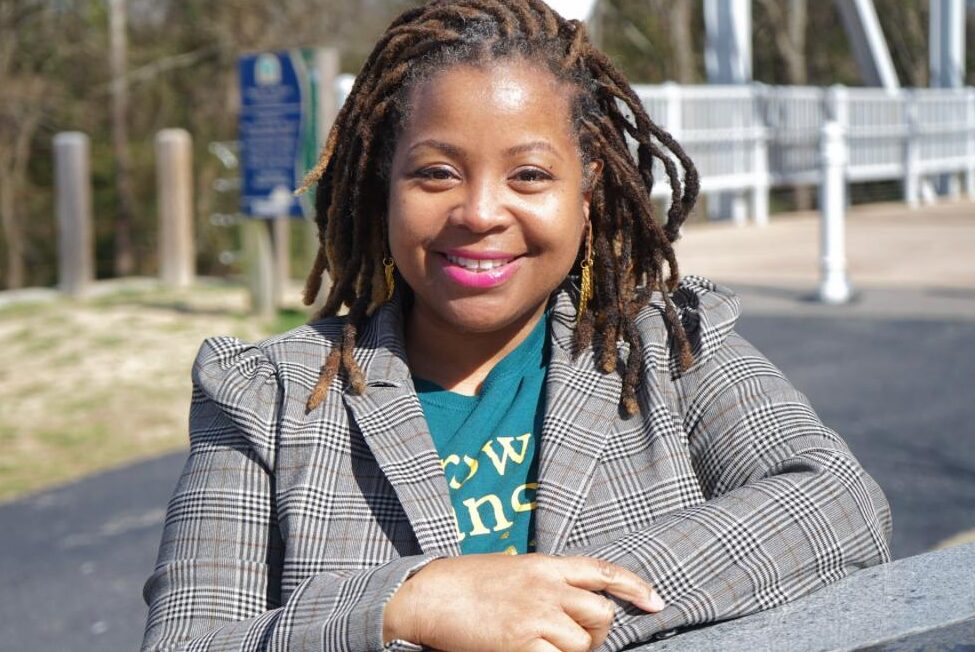
That very sentiment resounded within the remarks that Dr. Atkinson, Dr. J, and Dr. Moore all had to share regarding their connection with one another.
“Even though we do have the education background, we’re also grounded in God’s grace and knowing that it’s because of him, that nothing happens by happenstance,” Dr. Atkinson said.
Having the opportunity to work side by side at ECU allowed the trio to nurture their sisterhood of trust, accountability, and love.
For them, that looked like being willing to display solidarity in decision making, while still being able to offer constructive criticism. It was also in their practice to communicate with one another about leadership opportunities that arose before either of them accepted. Operating in the spirit of promoting solidarity, not competition, some moments led to all three of them deciding to take on a role or opportunity together.
Their relationship would become an aid during adversity. Covid emerged as a challenging period where they were able to rely on each other, centered on staying spiritually uplifted and anchored in God. The same would be true for their encouragement for one another throughout their completion of the educational leadership doctoral program at University of North Carolina at Wilmington (UNCW).
Having been the last of the three to receive her degree in fall 2022, Dr. Atkinson was overwhelmed with joy when sharing that Dr. Moore and Dr. J were present to celebrate and hood her at graduation.
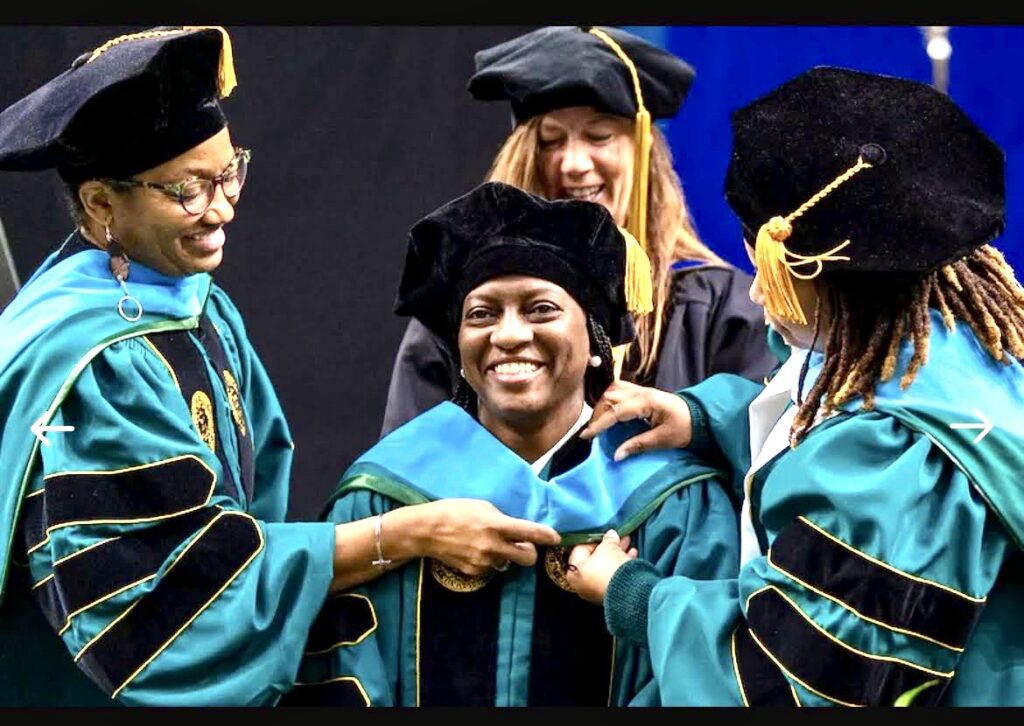
Beyond a degree
In the words of Dr. J, “Our thinking is, we got this degree to see what we can do for our community.” Dr. J is now a faculty member at UNCW, while Dr. Atkinson and Dr. Moore both continue their work at ECU. Yet, the sisterhood persists.
Overall, in their respective areas, each has their hearts set on being an inspiration, especially to the next generation of Black women in education.



Here are direct messages to fellow Black women regarding the importance of faith and sisterhood along the journey:
“The message would be that there is no part of your life that is not intentional. There is no part of your life that is not intentional. A lot of times people go through the rigmarole of their days of their life, year after year after year, and they think “I’m just here.” No, you’re not. Everything is intentional, everything is purposed.”
Dr. Moore
“Stand tall. To consider themselves leaders no matter their role or position, and always work with other Black women to push or challenge you as an educator, as a community leader. Always find and create. If there isn’t a space specifically for you in your school building or your organization, as a Black educator create a space that makes your voices as Black women teachers visible, that makes your pedagogy visible, that makes what you do in the community visible; and create that space for you and your sisters, because when you do that for your sisters you also do it for your community that you’re serving.”
Dr. J
“I love y’all! Y’all my sister scholars. Just keep thriving. The world is not fair; The world is not for us, it seems, but we got the power to change all of that. We just got to stick together, we got to keep lifting each other up. […] there’s a whole lot of excellence inside of us that the world needs to see. We’re necessary. Black women, we’re necessary; our voices, our style, and grace, all of us is necessary.”
Dr. Atkinson
